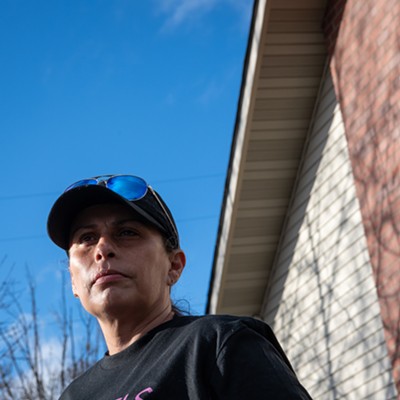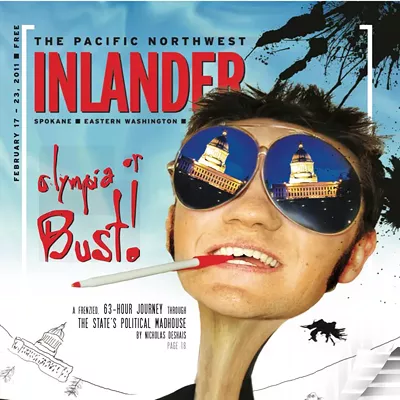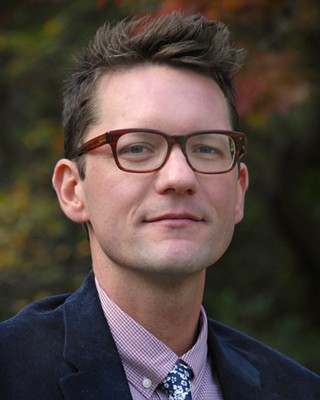Al French has a wall of plaques, awards and diplomas. The Association of Washington Cities named the Spokane city councilman a municipal leader. He’s been trained by FEMA to handle regional crises, and local law enforcement recognized his help in bringing community-oriented policing to the Nevada-Lidgerwood neighborhood. The regional Kiwanis club named him Man of the Year.
But his favorite award is an etched circle of glass that sits on his seventh-floor windowsill overlooking Spokane Falls. He got it last year from the American Public Transportation Association. “There’s only one person in the entire country that gets that once a year,” he says about the award when asked about his success in City Hall. “So, yeah, I’ve been pretty effective.”
In a little more than two years, if things pan out, Al French could be the next president of the Spokane City Council. Sure, he says that’s not his plan, but he’s quick to add that he’s more than qualified (look at all the things on his wall). And the man has ambition, even if it’s “nothing more than at the city level,” as he says. He gained his seat on the council in 2001, after having lost an election to Steve Corker two years before. In 2003, he made a run for council president and lost to Dennis Hession. In 2007, he made a bid for mayor, again against incumbent Hession and former council member Mary Verner. Verner won, and now French finds himself near the end of his second — and therefore last — term.
But more important for his potential council president bid, a committee headed by French wants voters to approve a proposal changing city rules that currently don’t allow him to run — rules approved by voters not that long ago. This Monday, the City Council will vote to put this proposal, among other changes to the city charter, on the August ballot.
Current Council President Joe Shogan says he’s a bit wary of changing the city’s charter in any way that loosens term limits. He says he likes new blood to circulate through City Hall. “I believe in renewal: new ideas, new concepts, new people. After eight years, it’s time for something new.” Plus, he says, the only reason for the change is to benefit French.
“I don’t think there’s any other reason for us to do this,” Shogan says. (“Yes. I’m the first person that might be affected by this change,” French admits.)
This change, specifically, is to just a few words in Section 6 of the charter. It currently says that after someone serves two consecutive terms on the council — whether as a council member or president — he (or she) can no longer serve in that branch of municipal government.
But if the changes are approved, the charter will allow that person to jump from position to position, from council member of this district to council member of that district to council president. Theoretically, until the end of time.
“Theoretically, we could. And in other cities, that’s exactly what they do,” French says, pointing to Seattle, Tacoma and Bellevue. “The theory is that it’s hard to lead a body if you don’t know what the body’s all about. … You really need to understand the institution, I think, before you can run for council president. You’ve got to have that background.”
Mike Piccolo, an assistant attorney with the city who joins council members on their dais at almost every meeting, says the charter’s authors probably wanted something closer to what French is describing. “The way it reads right now is … if you serve two terms, you’re done forever,” he says. “A lot of people say that wasn’t the intent of the folks who put this forward.”
Not so, says Dr. John Sonneland. In 1994, Sonneland spearheaded the campaign limiting council members to just two terms, strictly out of his fierce opposition to career politicians. In fact, spurred by his attitude toward reform, he challenged longtime U.S. House Speaker Tom Foley four times — in 1978, 1980, 1982 and 1992.
“When government gets into problems is when people make a career out of it,” Sonneland, now retired, says. His crusade to limit council members was successful: Voters approved the term limits by a percentage of 64 to 36. Now he’s worried that his work, which he still stands behind, will be undone. “I know one thing. I sure as ‘H’ don’t want some lawyer down at City Hall tinkering with something that voters passed years ago.”
But French sees it differently. “There’s a number of changes that have happened to the city charter in the last 10 years, and each one of those changes was not holistic in terms of the entire document,” he says. For him, it’s just some routine maintenance. Besides, he couldn’t care less if his committee’s recommendations win voter approval.
“Whether this passes or not, I don’t really care. … If [voters] leave it the way it is, at some point somebody will challenge it legally. So it doesn’t matter,” he says.
On top of that, it has nothing to do with him. Anybody who believes French wants to change the charter to help himself is paranoid: “Conspiracy theories and black helicopters and that kind of nonsense,” he says. “I’m one vote of 11 [members on the charter review committee]. If you miss that fact, you got to do a better job of reporting. One vote of 11.”
But without the change, he wouldn’t be allowed to run for council president in 2011, right?
“Yes. Right. Well, not without challenging the ordinance.”
























